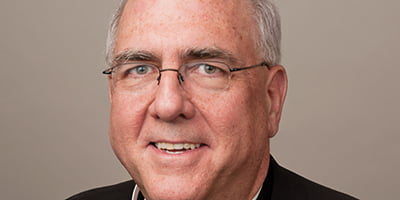by Archbishop Joseph F. Naumann
In the part of South St. Louis where I grew up, on Halloween it was not sufficient for children to come to the door and just say, “Trick or treat!” in order to be rewarded with some candy. Children were expected to sing a song or tell a joke.
If you have participated in a Mass that I celebrated and heard me struggle through singing the doxology at the end of the eucharistic prayer, you understand a song was not an option for me. Sometimes, in lieu of jokes, children would tell riddles. One of my favorite is: “What is greater than heaven, worse than hell? Dead people eat it. Live people eat it and die.”
“Infinity Dwindled to Infancy” is the title of the last book written by the late Jesuit Father Edward T. Oakes. Many of our priests who did their theological studies at Mundelein Seminary in Chicago had Father Oakes as a professor. In the first chapter of his book, Father Oakes explains the difference between a paradox and a contradiction.
One of the logical premises for all scientific study is Aristotle’s law of noncontradiction. Father Oakes argues for a distinction between the absurdity of simultaneously holding contradicting positions as both true and paradoxical statements that lead us to discover deeper truths.
Father Oakes maintains that poets most readily grasp “the value of paradox as a valued avenue to truth.” To illustrate his point, he uses a passage from Shakespeare’s “Romeo and Juliet.”
In the passage Father Oakes selected, Friar Lawrence is speaking to Romeo right before he is to marry Juliet. Romeo and Juliet have been separated only for a few hours but, in their adolescent love, it seems to them an eternity. Sensing that Romeo is too eager for Juliet’s arrival, Friar Lawrence cautions:
“These violent delights have violent ends,
And in their triumph die, like fire and powder,
Which as they kiss consume. The sweetest honey
Is loathsome in its own deliciousness
And in the taste confounds the appetite.
Therefore, love moderately. Long love doth so.
Too swift arrives as tardy as too slow.”
Through Friar Lawrence, Shakespeare gives the audience an insight into love, the truth of which is confirmed by their own experience. What on the surface might seem clearly contradictory yields a truth that more linear logic is unable to describe.
Father Oakes notes that philosophy has a long tradition of accepting paradoxical truth. Some philosophers readily acknowledge the reality of apparently conflicting statements both being true. To illustrate his theory, he points to the claim of stoic philosophy that only those are free who know they are not free.
In reflecting on the meaning of Christmas, the Christian believer is presented with a number of paradoxes. How can the eternal become temporal? How can a baby born into the world be worshiped as the creator of that world? How can the unchanging enter into the world of change? How can the Immortal One come into the domain of death? How can an infinite God become a finite man? How can a virgin be a mother? How can God die? How can a dead man live? These are just some of the paradoxes our Christian creed contains.
Yet, if paradoxes can help us understand the complexity and beauty of human love, can they not also help us to grasp the wonder and awe of the Word made flesh? We must be careful not to oversimplify our faith by attempting to confine it into the straightjacket of logic.
Father Oakes begins his book by quoting G. K, Chesterton: “The key has no logic to its shape. Its logic is: it turns the lock.” The miracle that we celebrate at Christmas is one that defies reason. How could God, the creator of the universe and author of life, become a human being? To the nonbeliever, this cornerstone to Christianity makes no sense. For the Christian, it is this paradox that is the key opening the lock to the door for understanding all of reality.
The wonder and awe of the miracle of Christmas is best expressed in poetry. For your Christmas meditation, I offer examples of the attempts of poets to penetrate the truth and beauty of God becoming man:
“New Prince New Pomp” by Robert Southwell, SJ (1561-1595)
“Behold, a silly tender babe
In freezing winter night
In homely manger trembling lives;
Alas! A piteous sight.
Despise him not for lying there;
First what he is inquire:
An orient pearl is often found
In depths of dirty mire.
This stable is a Prince’s court,
The crib his chair of state,
The beasts are parcel of his pomp,
The wooden dish his plate.
With joy approach, O Christian [fellow],
Do homage to thy King;
And highly praise this humble pomp
Which he from heaven doth bring.”
“The Blessed Virgin Compared to the Air We Breathe” by Gerard Manley Hopkins, SJ (1844-1889)
This air, which by life’s laws,
My lung must draw and draw
Now but to breathe its praise,
Minds me in many ways
Of her who not only
Gave God’s infinity
Dwindled to infancy
Welcome in womb and breast
Birth, milk, and all the rest
But mothers each new grace
That does now reach our race.”
In case, you were wondering, the answer to the riddle is: Nothing!


